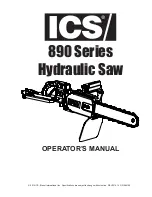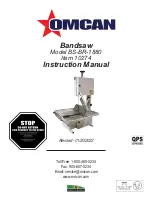
11
Depth stop
Note.
Ensure that the depth stop
is adjusted to the correct height
before commencing operation.
The adjustable depth stop is
threaded into the rear pivot
mount at the rear. By raising
and lowering the depth stop bolt
with the a hex key (Fig. T) the
travel of the cut off wheel can be controlled. This feature is
particularly useful to prevent contact with the work bench
under guard. when a new disc is fitted or increase disc
travel as the abrasive disc wears. The depth stop should be
checked and adjusted every time a new disc is fitted.
The depth stop will require adjustment as the wheel wears.
To adjust, loosen the lock nut (anti Clockwise) and then
rotate the depth stop clockwise to allow the disc to cut
deeper, or anti clockwise to prevent full depth of cut travel.
When the correct depth of travel is obtained, ensure to hold
the depth stop screw and tighten the lock nut in a clock wise
direction to ensure the screw is locked.
DO NOT OPERATE THE SAW WITHOUT THE LOCK NUT
FULLY TIGHT AND THE DEPTH STOP SECURE.
Operation
1. Make all adjustments including setting the vice, fence
position and fence angle.
2. Ensure that the workpiece is fully secured before starting
any cutting.
Note.
Ensure you are wearing the appropriate safety gear
including eye protection and hearing protection.
3. Check that the disc, guard and tool are in good condition.
4. Plug the cordset into the mains socket.
5. Push the lock-off button and pull the trigger to start
the tool.
6. Bring the disc down onto
the workpiece and allow it
to cut its way through the
workpiece without undue
force (Fig. U).
7. Once the cut is finished, raise
the arm to clear the disc from
the workpiece, release the
trigger and the cut off saw
will stop. Please note that the disc will continue to turn
for a few revolutions even though the saw is switched
off. Keep your hands well away from the moving disc.
Some helpful tips when using the chop saw
•
Disc selection. The cutting disc must match the material
to be cut. There are a wide variety of cutting discs
and careful selection will assist in the correct and safe
operation of the saw. For example, select a bar cutting
disc for cutting solid metal section and a metal stud
cutting disc for cutting steel sections. General purpose
metal cutting discs are also available but where possible
it is better to use the correct cutting disc for the task
being performed.
•
Abrasive cutting discs wear. The cutting discs wear so as
to constantly expose to the material being cut clean and
sharp cutting edges. This is normal for this type of cutter.
•
During the cutting operation apply a constant and even
pressure to the cutting arm. The disc should be constantly
cutting, and sufficient pressure needs to be applied to
keep the cutting action going. If insufficient pressure is
applied, the wheel has a tendency to clog, and the cutting
edges of the disc become blunt and the cutting process
reduces considerably. This is called glazing of the wheel
and is due to the incorrect cutting disc for the material
being cut, or the cutting rate being too slow.
•
Do not overload the saw. The saw should run during
the cutting operation at close to full speed. Too much
pressure being applied to the tool will slow the motor
and can cause motor failure.
T
U


































